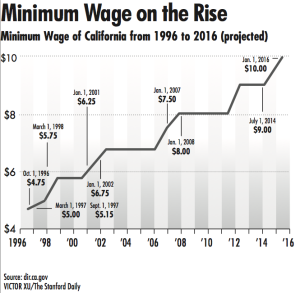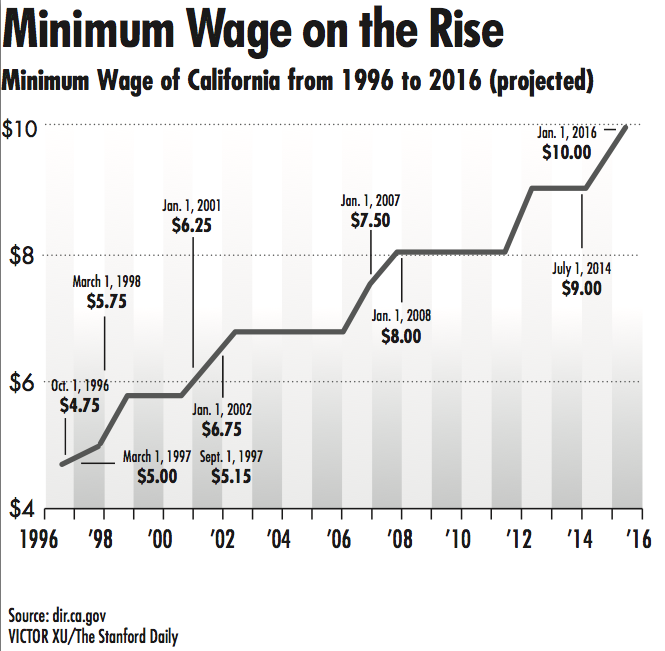
The Stanford community holds mixed opinions on the potential benefits and harm from the California state legislature’s recent decision to pass a bill that will elevate the state’s minimum wage from $8 an hour to $9 by July 2014 and $10 by January 2016.
The bill, signed into law by Governor Jerry Brown, will create the highest minimum wage in any state in the United States and cap California’s steady increase in its minimum wage standard over the last two decades.
“The minimum wage has not kept pace with rising costs,” Brown said in a press release. “This legislation is overdue and will help families that are struggling in this harsh economy.”
Marcos Guen Lopez ‘17, a resident of Upland, Calif., agrees with Brown’s intentions behind signing the bill into law.
“You can’t do much with the minimum wage with such high costs,” Lopez said. “A person with a family cannot survive on the [current] minimum wage.”
David Grusky, director of Stanford’s Center for Poverty and Inequality who studied income inequality and the labor market, also cited the measure’s present necessity.
“We have languished at a very low minimum wage for way too long,” Grusky said. “California is the land of working poverty.”
Grusky added that, despite economic models predicting negative repercussions, in reality there are no substantial negative impacts on California’s current economy. He hopes that the minimum wage will act as a stimulus to combat the increasing poverty in California and invigorate the state’s slow economic recovery.
However, other Stanford experts believe that the new legislation may actually be detrimental to the Californian economy.
Caroline Hoxby, professor of economics and senior fellow of the Hoover Institution, explained that California’s economy went into recession quickly but will slowly recover. She argued that the legislation is potentially problematic during the current period of recession.
“People who lose their jobs when minimum wage is raised are usually people who have difficulty finding jobs,” Hoxby said. “Therefore, during recession, the economy is especially likely to hurt the people who are poorest.”
Another potential danger of elevating minimum wage is the movement of jobs to bordering states, such as Oregon, Nevada and Arizona, which have lower minimum wages. Hoxby warns that an employer who is located in California could relocate his or her businesses to other states nearby for cheaper labor.
Brandon Camhi ‘16, editor in chief of the Stanford Economics Journal, also argues against the measure.
“An increase in minimum wage will adversely affect economic growth of California,” Camhi said. “Employment is still slow, so you are going to dis-incentivize employers from hiring most people. Furthermore, this is going to affect those who are priced out of the market, such as single moms or those who are truly dependent on the minimum wage.”
Hoxby suggested other alternatives to helping Californians.
“The most important thing is introducing more certainty on how regulations are applied,” Hoxby said. “Furthermore, federal issues, health care law and reducing other regulations or taxes can all be improved.”
“California has a high tax in the economy. We have to take steps to reduce those,” she added.
Contact Peter Moon at pmoon ‘at’ stanford.edu.
